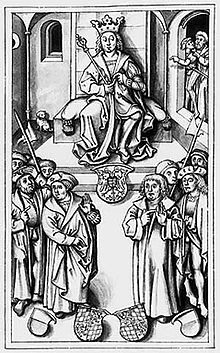Cologne arbitration award
The Cologne arbitration award of the Roman-German King Maximilian I at the Reichstag in Cologne on July 30, 1505 ended the Landshut War of Succession .
prehistory
The Landshut War of Succession from 1503 to 1505 was triggered by a dispute over the succession in the Bavarian duchy of Bavaria-Landshut when the last duke there, George the Rich , died without male descendants. The main participants were the Wittelsbacher -Linien Bayern-Landshut with Georg's heir daughter Elisabeth and her husband Ruprecht of the Palatinate and the Duke of Bavaria-Munich as well as King Maximilian I from the House of Habsburg . The fortunes of war had leaned towards Duke Albrecht IV of Bavaria-Munich. However, the first peace negotiations on December 10, 1504 in Mittenwald failed. On January 23, 1505, the Palatine general Georg von Wisbeck was defeated by the Bavarian troops near Gangkofen , and on February 9 an armistice came into force. In the run-up to the Cologne arbitration, there had already been secret agreements between Innsbruck court marshal Paul von Liechtenstein-Kastelkorn and Duke Albrecht IV towards the end of March / beginning of April 1505.
Cologne arbitration award
On June 14, 1505, in the run-up to the Cologne Reichstag, the official arbitration negotiations on the division of the Lower Bavarian heritage began. At the Reichstag in Cologne on July 30, 1505, the following result was announced:
- The main inheritance falls to the Duke of Bayern-Munich . The Duchy of Bavaria is thus reunited after the late medieval partitions.
- The two grandchildren of Duke Georg, Ottheinrich and Philipp , receive the Young Palatinate , a fragmented area from the Upper Danube via Franconia to the northern Upper Palatinate . Neuburg an der Donau becomes the capital of the new state . The rest of the area goes to the Munich line of the Wittelsbach family .
- The area around Kufstein , Kitzbühel and Rattenberg falls to Maximilian I himself as the price of his mediation. The Zillertal and Mondseeland also go to the Habsburgs.
- The imperial city of Nuremberg gains significant areas east of the city, including the offices of Lauf , Hersbruck and Altdorf .
literature
- Rudolf Ebneth, Peter Schmid (Ed.): The Landshut War of Succession. At the turn of the Middle Ages to the modern age. House of cards collective graphic services, Regensburg 2004, ISBN 3-88246-266-3 .
- Reinhard Stauber : The Landshut War of Succession - Self-Destruction of the House of Wittelsbach? In: Jörg Peltzer , Bernd Schneidmüller , Stefan Weinfurter , Alfried Wieczorek (eds.): The Wittelsbachers and the Electoral Palatinate in the Middle Ages. A success-story? Schnell + Steiner, Regensburg 2013, ISBN 978-3-7954-2645-3 , pp. 207-230.
Web links
- Dietmar Heil: Cologne arbitration award, July 30, 1505 . In: Historical Lexicon of Bavaria
- Map: The Palatinate, Upper Bavaria and Lower Bavaria before the Landshut War of Succession (House of Bavarian History)
- Map: The Palatinate with the Upper Palatinate, Palatinate-Neuburg and Bavaria after the Landshut War of Succession (House of Bavarian History)
